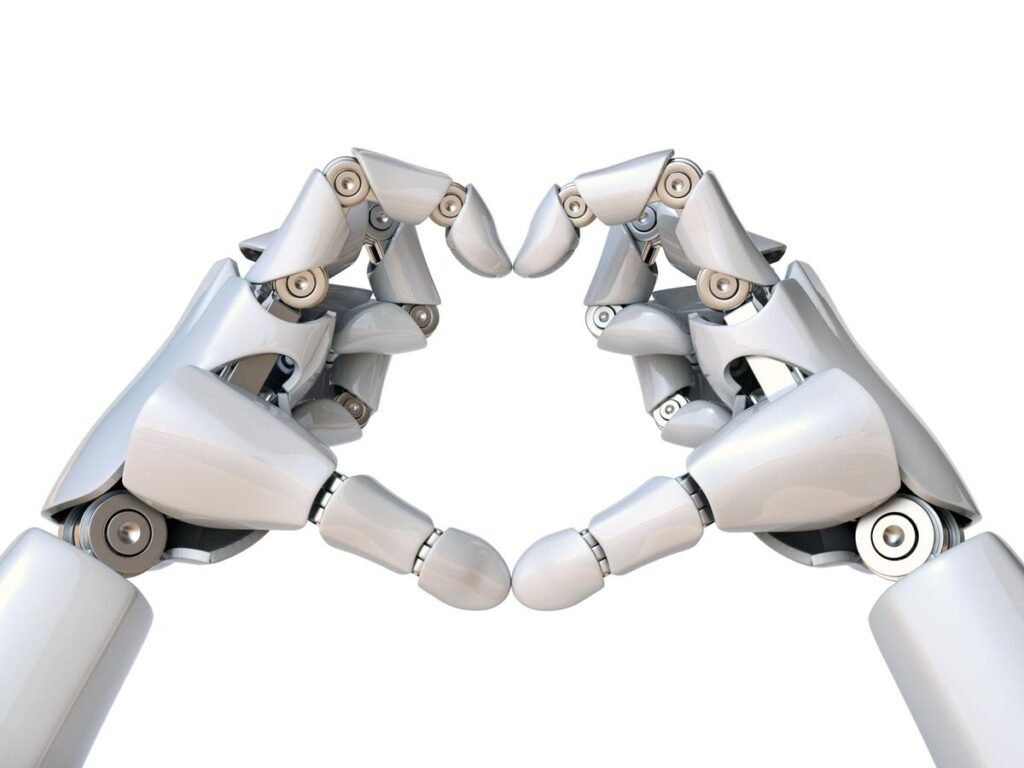Robot hands form a heart shape 3D rendering
In an age where technology permeates every aspect of life, artificial intelligence (AI) is making a unique foray into the realm of romance and relationships. Far from being cold and mechanical, people are already using AI to deepen emotional connections and enhance romantic experiences. Let’s explore how each of us can harness the use of AI tools to nurture relationships and further strengthen romantic bonds.
Current Applications of AI in Romance
AI is already a great communication coach and is growing rapidly in relationship management. Communication is a cornerstone of romantic relationships, and AI is a major asset in enhancing this aspect. Apps like Replika and My AI Friend offer AI-powered chatbots designed to encourage open communication and emotional expression. Although initially created for general companionship, many users have reported using these apps to practice expressing affection and resolving conflicts, thereby indirectly benefiting their real-life relationships.
Plus, how about asking for AI-based relationship advice? AI platforms offer personalized relationship advice. Relish is a relationship coaching app that uses AI to analyze couples’ communication patterns and provide personalized advice to improve their relationship. The app uses quizzes and activities designed by relationship experts, combined with AI analysis, to guide couples through their journey.
For long-distance relationships, there are Virtual Reality (VR) Date Nights. Today, AI-powered VR technologies deliver immersive dating experiences. Platforms like vTime XR allow couples to meet in virtual environments, enhancing their connection despite physical distances. This technology has proven particularly beneficial during the COVID-19 pandemic, allowing couples to maintain a sense of closeness.
For AI aimed at improving intimacy, Pillow Talk apps have people covered. It uses AI to learn and suggest conversation starters and intimacy-promoting activities. By analyzing a couple’s interaction patterns, the app offers personalized suggestions to deepen their connection.
AI robots helping with matchmaking
AI in matchmaking and finding love
Matchmaking is another area where AI has made significant progress. Dating apps like Tinder and Bumble use AI algorithms to suggest potential matches based on user preferences, behaviors, and interaction patterns. The AI in these apps analyzes user data to increase the chances of a successful match, leading to more meaningful connections. An innovative example is Hinge, which uses an AI feature called Most Compatible to suggest matches. This AI tool learns from users’ likes and spends within the app to recommend the profiles they are most interested in and compatible with in order to find more meaningful matches.
AI in birthday reminders and gift suggestions
Couples are turning to AI to celebrate relationship milestones. AI-powered reminder apps ensure that important dates like birthdays are not forgotten. Additionally, AI-powered gift recommendation engines suggest thoughtful, personalized gifts based on the partner’s interests and past preferences. For example, the Amazon Gift Finder uses AI to suggest gifts based on minimal information about the recipient’s tastes and interests. This tool has proven to be particularly useful for those who struggle to choose the right gift for their partner.
A robot hand and a human hand create a heart via the HUD screen. 3D illustration.
Potential future applications of AI in romance
Looking to the future, AI has the potential to further transform romantic relationships in several intriguing ways. The first is emotion recognition technology. Future AI tools could use artificial empathy technology to help partners better understand each other’s feelings. By analyzing facial expressions, voice tones and physiological signals, AI could provide information about a partner’s emotional state, facilitating better communication and empathy. The second is AI-based couples therapy. Facing a universal shortage of therapists, AI will play a major role in couples therapy by providing real-time feedback and suggestions during discussions. This technology could help couples understand their communication patterns and offer constructive ways to resolve conflicts. Third is augmented reality (AR) for romantic experiences. AR combined with AI could create immersive and romantic experiences for couples, like recreating a first date scenario or visualizing shared future goals. Fourth, predictive analytics for relationship health. Today, people already have access to AI systems that analyze communication patterns and behaviors to predict potential challenges in a relationship. These tools offer preventative advice and strategies to strengthen the bond between couples.
AI’s role in enhancing romance and relationships speaks to the growing versatility of technology and its sensitivity to human needs. From improving communication to personalizing romantic gestures, AI is becoming a valuable ally in nurturing and maintaining strong, healthy relationships. As AI continues to evolve, its potential to positively impact the emotional and romantic facets of our lives is immense. Adopting these technologies can lead to deeper connections, greater understanding, and more fulfilling relationships in the digital age.

